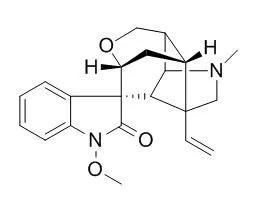| In vitro: |
| Strait Pharmaceutical Journal, 2010 , 22 (3) :197-200. | | Cytotoxic effects of alkaloidal compounds from Gelsemium elegans Benth on the tumor cells of digestive system in vitro[Reference: WebLink] | To investigate the antitumor activity of alkaloid compounds from Gelsemium elegans Benth by cytotoxicity assay on digestive system tumor cells(SW480,MGC80-3,TE-11,HepG2)and analyse their structure-activity relationship.
METHODS AND RESULTS:
Four alkaloid compounds were assessed for cytotoxic activity using the microculture 3-(4,5-dimethylthiazol-2-yl)-2,5-diphenyltetrazolium bromide(MTT)assay for cellular viability. The results showed that Koumine,Gelsemine,Gelsenicine and Gelsevirine could significantly inhibite the proliferation of human carcinoma cell line SW480 and MGC80-3 in a dose-dependent manner.The 50% inhibiting concentration(IC50)of Koumine,Gelsemine,Gelsenicine and Gelsevirine on SW480 cells were 0.45±0.10,0.76±0.28,0.52±0.22 and 1.41±0.06 mmol·L-1 respectively,and were 0.82±0.19,1.20±0.33,1.14±0.23 and1.22±0.11 mmol·L-1 respectively on MGC80-3 cells.Koumine,Gelsemine and Gelsenicine also could inhibite the proliferation of TE-11 and HepG2 cells in a dose-dependent manner.IC50 of Koumine,Gelsemine and Gelsenicine on TE-11 cells were 0.74±0.05,1.94±0.30 and 1.73±0.35 mmol·L-1 respectively,and were 1.26±0.32,1.82±0.35 and 1.79±0.54 mmol·L-1 respectively on HepG2 cells.
CONCLUSIONS:
The alkaloid compounds from Gelsemium elegans Benth had obvious antitumor activity on digestive system tumor cells in vitro.Moreover there is a close relationship between their structure and effect. |
|
| In vivo: |
| Psychopharmacology (Berl). 2013 Feb;225(4):839-51. | | The active alkaloids of Gelsemium elegans Benth. are potent anxiolytics.[Pubmed: 23052566] | An increasing number of herbal products has been introduced to treat anxiety and depression. Gelsemium elegans Benth (G. elegans) is a well-known herbal plant in Asia. Four major alkaloids (gelsemine, koumine, Gelsevirine, and gelsenicine) have been isolated from G. elegans.
METHODS AND RESULTS:
Gelsemine, koumine, and Gelsevirine, but not gelsenicine, exhibited potent anxiolytic effects in the two anxiety models. None of the four G. elegans alkaloids exerted antidepressant effects in the two depression models. None of G. elegans alkaloids impaired spontaneous motor activities. The intracerebroventricular administration of strychnine significantly antagonized the anxiolytic effects of gelsemine, koumine, and Gelsevirine administrated subcutaneously.
CONCLUSIONS:
Gelsemine, koumine, and Gelsevirine could be developed as the treatment of anxiety-related disorders in human patients. Their anxiolytic mechanism may be involved in the agonist action of glycine receptor in the brain. |
|






 Cell. 2018 Jan 11;172(1-2):249-261.e12. doi: 10.1016/j.cell.2017.12.019.IF=36.216(2019)
Cell. 2018 Jan 11;172(1-2):249-261.e12. doi: 10.1016/j.cell.2017.12.019.IF=36.216(2019) Cell Metab. 2020 Mar 3;31(3):534-548.e5. doi: 10.1016/j.cmet.2020.01.002.IF=22.415(2019)
Cell Metab. 2020 Mar 3;31(3):534-548.e5. doi: 10.1016/j.cmet.2020.01.002.IF=22.415(2019) Mol Cell. 2017 Nov 16;68(4):673-685.e6. doi: 10.1016/j.molcel.2017.10.022.IF=14.548(2019)
Mol Cell. 2017 Nov 16;68(4):673-685.e6. doi: 10.1016/j.molcel.2017.10.022.IF=14.548(2019)